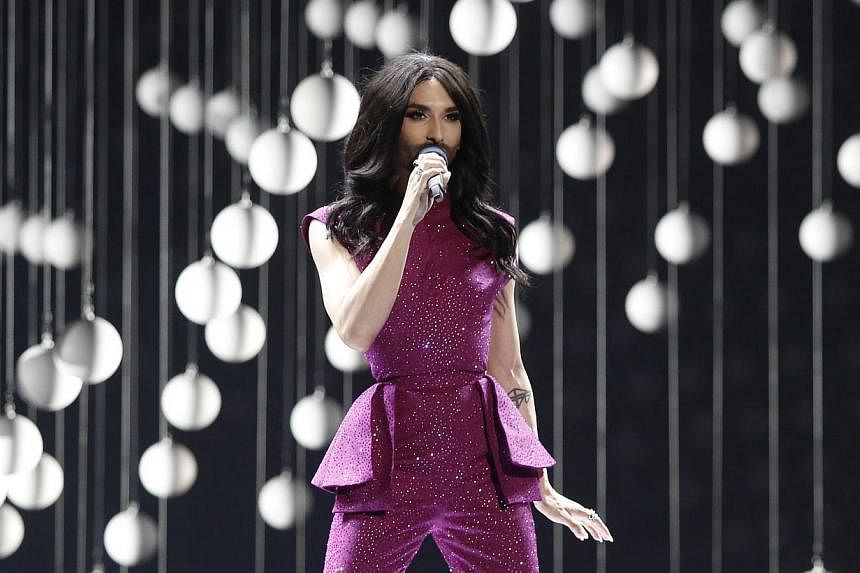VIENNA (AFP) - Austrian bearded drag queen Conchita Wurst, resplendent in a sparkly, backless purple outfit, floated onto the stage in Vienna Saturday to begin the 60th Eurovision Song Contest, Europe's annual anything-goes pop fest.
The difference this year for the clash of the catchy, corny and camp watched by around 200 million people worldwide is that Australia - where Eurovision has long had a cult following - is taking part.
But whether hunky former "Australian Idol" champion Guy Sebastian can wow the millions watching at home and professional juries in each nation remains to be seen, with tough competition among the 27 acts.
The favourite - although the competition is notoriously difficult to predict - is chiseled Swede Mans Zelmerlow, hoping to repeat the magic of global superstar compatriots Abba back in 1974.
A stiff challenge also comes from Russian Polina Gagarina with A Million Voices, a paean to peace that she hopes will silence the boos that Russia's entry got last year after the annexation of Crimea.
If she wins, Eurovision will be in Russia in 2016 - a prospect not relished by Patriarch of the Russian Orthodox Church, who said Thursday the contest promoted values "repulsive to our soul and our culture".
Others with good chances are Italian pop opera Il Volo, Belgian Loic Nottet, Morrland and Debrah Scarlett of Norway - the country that holds the record for scoring zero points the most times - and dark horse Serbian diva Bojana Stamenov.
Long shots include Ann Sophie of Germany - whose first-choice act withdrew - Knez of Montenegro, Poland's Monika Kuszynska in a wheelchair, and shaggy-haired Austrians The Makemakes.
"It's very overwhelming. I've been fortunate enough to perform on various different stages but when you get on that Eurovision stage it's like nothing else I've ever done in my life," said Australia's Sebastian.
Geopolitics will again be present this year with Armenia's ballad - described by one magazine as "feeling as long as a Wagner opera" - widely seen as being about the 1915 mass killings by Ottoman Turkey, with the chorus "don't deny".
Turkey, which refuses to recognise the killings as genocide, has been absent from Eurovision since 2012.
Another no-show is Ukraine, cash-strapped from the conflict with Russian-backed rebels in its east.
TURKEYS, ORCS AND BABUSHKAS
Mostly though the riotous affair, open to the 56 members of the European Broadcasting Union and a world away from its civilised black-and-white beginnings, is about not taking life too seriously.
Previous entries have included six Russian grannies, Ireland's irreverent Dustin the Turkey and Finnish heavy metal outfit Lordi - looking like orcs from Lord Of The Rings - who won in 2006 with Hard Rock Hallelujah.
The lyrics often make no sense, if they are in any recognised language at all, like Diggi-Loo Diggi-Ley by golden-booted Swedish Mormon brothers Herreys in 1984, La La La in 1968 or Lulu's Boom-Bang-A-Bang in 1969.
And who can forget the chorus to Austria's 1977 entry: "Boom boom boomerang, snadderydang. Kangaroo, boogaloo, didgeridoo. Ding dong, sing the song, hear the guitar twang. Kojak, hijack, me and you."
The event has also long stressed tolerance for the unconventional, as witnessed by Israeli transgender Dana International in 1998, Ukraine's Verka Serduchka in 2007 and Austria's Conchita last year.
Conchita's message has been enthusiastically adopted by Viennese authorities, including with special gay-themed traffic lights.
"I like the feeling because it's a little bit trashy but it's also very exciting," said one German fan attending for the first time.
"I have loved this show for 15 years and watch it every year on television."
Jean-Paul Philippot, chairman of the EBU, told AFP that Eurovision is "the opposite" of talent shows like The Voice or The X Factor.

